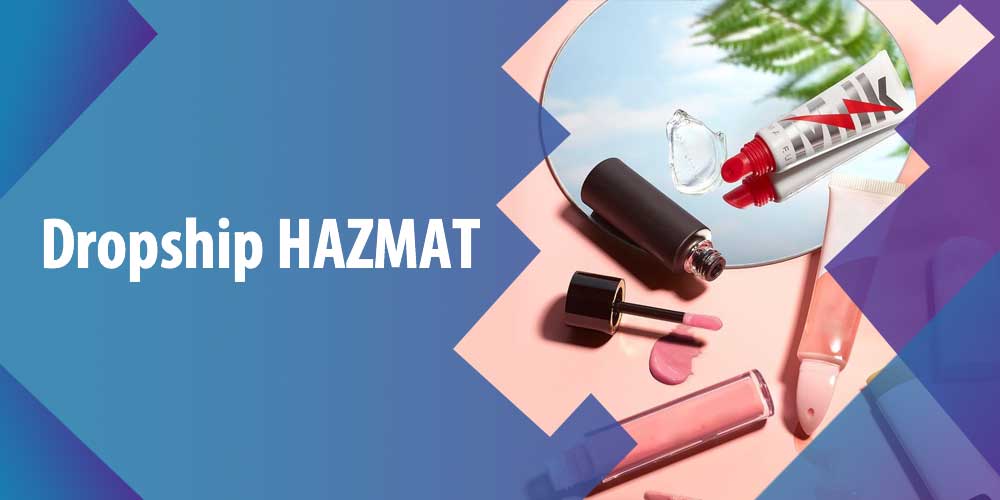It’s essential to be aware of shipping restrictions when selling products online — even if you technically never come into contact with the product. You’d end up with refunding customers and losing fortune if you dropship some products that’s not allowed shipping. Here’s what you need to know about dropshipping hazardous materials:
What Defines Hazardous Materials?
Unlikely products you wouldn’t initially think of as dangerous could be considered HAZMAT. The Federal Motor Carrier Safety Administration has established nine categories of hazardous materials and they are:
Class 1: Explosives
This involves any products that could cause an adverse chemical reaction resulting in the package detonating.
Examples: dynamite, ammunition, and gun powder.
Dropshippers should strictly avoid dropshipping any explosives.
Class 2: Gasses
This involves flammable gasses, non-flammable and nontoxic gasses and toxic gases.
Examples: products come with compressed gases, including hair sprays and lighters with refills
Dropshippers should strictly avoid dropshipping any gasses.
Class 3: Flammable and Combustible Liquids:
It covers all liquids that could be considered flammable.
Examples: perfumes, nail polish, lighter refills, and oil-based paints
Some products under this criteria are eligible for dropshipping, and you need to make sure to work with reliable shipping carriers.
Class 4: Flammable Solids
It refers to solids that considered self-reactive and flammable.
Examples: coal, oil, and sodium batteries
Some products under this criteria are eligible for dropshipping, and you need to make sure to work with reliable shipping carriers.
Class 5: Oxidizing Substances and Organic Peroxides
You’ve likely seen the sign that depicts an ‘O’ on fire — that sign was explicitly designed for this category.
Dropshippers should strictly avoid dropshipping any products under this category.
Class 6: Toxic Substances and Infectious Substances
This class covers toxic substances and infectious substances.
It is pretty obvious that dropshippers should strictly avoid dropshipping any products under this category.
Class 7: Radioactive Materials
It covers any materials that give off ionizing radiation above a certain threshold.
It is pretty obvious that dropshippers should strictly avoid dropshipping any products under this category.
Class 8: Corrosive Substances
A corrosive substance is harmful when coming into contact with human skin.
Examples: wet batteries, mercury thermometers.
Dropshippers should strictly avoid dropshipping any products under this category.
Class 9: Miscellaneous Hazardous Materials
The final HAZMAT classification is miscellaneous hazardous materials. Some Examples: lithium-ion batteries, dry ice.
Some products under this criteria are eligible for dropshipping, and you need to make sure to work with reliable shipping carriers.
If you’re worried that you may not know whether you’re directly or indirectly shipping hazardous materials, check out the FAA’s Commonly Shipped Undeclared Hazardous Materials.
What products are considered HAZMAT while doing dropshipping?
In dropshipping world, majority of orders are shipped straight from China to customers worldwide, and due to the nature of international shipping, the range of prohibited products are even wider than HAZMAT. So apart from the prohibited classes mentioned above, here are some more that you need to pay attention to. Shipping carriers usually refer to them as ‘sensitive products’ – some of them are eligible for dropshipping shipping (B2C international shipping), while some of them are not.
Products that are categorized as ‘sensitive’ in the eCommerce industry include:
Liquid products
Many skincare and cosmetics products fall in this type. For example, toner, cream, facial masks, makeup remover, sunscreen, nail polish, and so on.
With dropshipping, you can only ship liquid products less than 100 Ml (3.38 ounces).
Powder products
This refers to many cosmetics products from mascara, eye shadow palette, lipstick, soap, highlighter and bronzer, and do son.
Electronics with batteries
This refers to any appliance that comes with built-in batteries or simply battery-required. Usually, shipping carriers ship products with 100Wh battery limit. Power banks are prohibited from B2C international shipping.
How to Dropship Products with Liquid, Powder, and Electronics with Batteries
You must follow strict rules and regulations when dropshipping hazardous materials.
- Pay attention if you dropship cosmetics, skincare, personal care, art supplies or electronics.
- Don’t ship liquid over 100 Ml (3.38 ounces)
- Don’t ship any products contains alcohol or flammable
- The shipping time is usually longer than shipping ‘normal goods’. In general, it takes longer than 2 weeks
Not many international carriers accept parcels containing hazardous materials, so you’ll need to contact some of the few companies that do. It’s important to note that you should contact them before dropshipping these products, to confirm the shipping eligibility, shipping time and shipping cost.
Don’t Let the Lengthy Process Stop You
There’s absolutely nothing wrong with wanting to dropship a product that is considered a hazardous material. If you wish to sell essential oils, facial masks, or battery-required equipment — there’s a market of customers out there who need these products to be shipped to them.
Choosing to dropship HAZMAT may take some extra time and energy to set up before you begin to sell. Most dropshipping suppliers are in China, so it’s essential to consider the shipping process in its entirety from China to your customers’ countries.
It could be slightly more challenging to find an international shipping carrier who accepts hazardous products to ship. Here’s the good news: a few Chinese logistics companies specialize in shipping hazardous materials, such as liquid and battery products.
Dropshipping is a lucrative business, but you may find yourself doing a little more legwork if you choose to dropship hazardous materials. If you’re looking to get first-hand access direct to Chinese suppliers and the infrastructure of China’s well-developed reliable global delivery system, you should check out our services. Happy dropshipping!
Latest articles you might be interested in:
- Discover Top 20 Dropshipping Suppliers for Your Online Business
- 5 Steps to Master Shopify Dropshipping for Profitable Business

